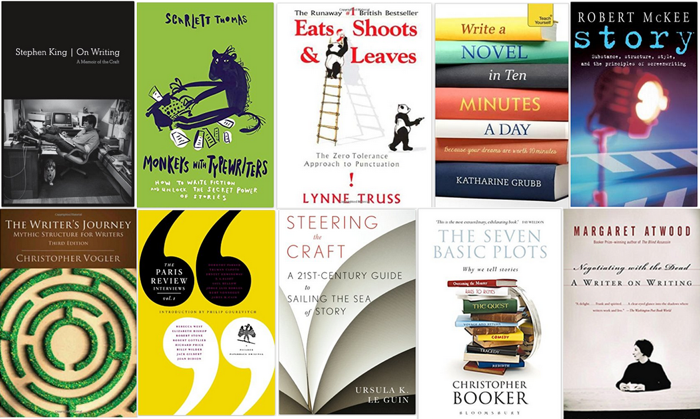5 rules for setting a writing goal you’ll stick to

Is your New Year’s resolution to write more? Every year? Follow Chris Smith‘s five golden rules to set a writing goal you’ll stick to.
[rt_reading_time label="Reading Time:" postfix="minutes" postfix_singular="minute"]
You might have a burning idea for a novel, something half-finished you’re determined to complete – or a blog that you know you need to update more regularly. Whatever it is you want to write, you’ve decided, THIS is the year that you finally want to kickstart your creative project.
Amazing! But when research shows that 92% of all New Year’s resolutions rarely make it past January, how can you make sure your writing resolution sticks? The first step is having a really great writing goal.
Writing goals are super-important in the pre-writing process. Having a goal gives you a sense of direction and something to work towards. If you don’t have a goal then you don’t have anything to aim for you can start off in the wrong direction. Setting a goal also helps you think about the future – and neuroscience tells us that this releases chemicals in the brain like dopamine and oxytocin and makes us feel happy and creative.
But some goals are better than others – some are great and others, not so good. We’ve helped thousands of people set writing goals using our digital writing coach and these five golden rules for setting goals work.
1. Make your writing goal specific
The first step in achieving any New Year’s writing resolution is to give yourself a target to hit.
You’ll need to make your writing goal measurable in some way. Think about how you’re going to achieve that goal – if it’s a large goal you need to break it down further into small steps. Do you want to write a certain number of blog posts over a period of time? Write a certain number of words each week or spend a certain length of time per month?
Make your goal as specific as you can. A good rule of thumb is to ask yourself: “How will I know that I’ve completed this goal?” If you don’t know, you’ll need to make your goal more precise.
2. Give your writing goal stakes
A good writing goal is personal to you and has stakes attached to it. This means that there needs to be some consequences if you don’t reach your goal and there needs to be some benefits if you do.
If there are no consequences or benefits attached then you’ll struggle to care whether or not you reach it because… well, what does it matter? And that means that you will lose motivation.
One way to give your goal stakes is to imagine yourself into the future and make a list of the benefits of meeting your goal – and the drawbacks of not meeting it.
Think about your life in 2019. How will your life have changed after meeting your writing goal this coming year? Will you have increased your career chances, improved your business? Will you feel more fulfilled, creative and happy?
3. Your writing goal must stretch you (but not too much)
Your New Year writing goal needs to energise you but it also needs to be winnable otherwise you’ll just lose motivation. It’s good to be ambitious but if you’re too ambitious – you risk falling at the first hurdle.
So, don’t get carried away. Try to get the balance right. Set a goal that stretches you in some way but is also realistic.
Saying that, don’t make your goal too easy to achieve either. If you think your goal looks a cinch to complete then you’ll probably just get bored along the way.
An indicator of a good goal is you want to achieve it – but you’re not 100% confident you can. Setting a goal that excites you is a good way to keep you motivated.
4. Schedule it in
Our research among thousands of writers indicates that planning in the time to write matters far more than the amount of time you allocate to writing.
It doesn’t much matter so whether you write in daily chunks – or whether you binge write to a deadline or whether you block out a portion of your day, week or month for writing – the key is that your writing time must be identified in advance – in whatever way works for you.
The very worst type of routine comes when you ‘try to find the time’ to write at the last minute. Not only is this a waste of time, it’s also a psychologically and physically depleting approach that will grind you down!
5. You’ve got to want to write it
Let’s face it, you’re going to be spending a lot of time with your writing project – so you’ve got to feel committed to it in some way. You have to feel an enthusiasm and passion for the project – or that you’ve just got to do it!
When you’re thinking about what you want to achieve, try to pick a goal that energises you in some way. Something that fires you up and you’ll get a kick out of achieving – or that if you don’t achieve you’ll be kicking yourself this time next year.
Things to remember
- Vague goals lead to vague outcomes. You have to know when you’ve reached your goal, so get specific.
- It’s good to feel a little scared by your goal. Not 100% sure you can make it.
- ‘Trying to find the time’ to write is depleting. Plan in the time in advance and prioritise your writing time.
- A goal without a challenge is just like work. Stretch yourself. Make your goal winnable, but not a sinch to achieve.
- You’ve got to want it. You have to really want to (or have to) write your project. Otherwise you’ll lose motivation.



